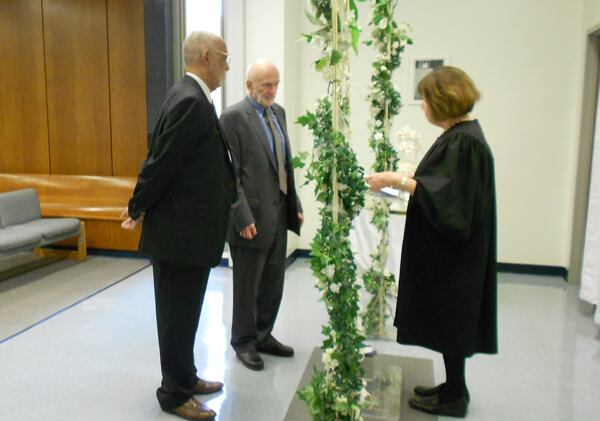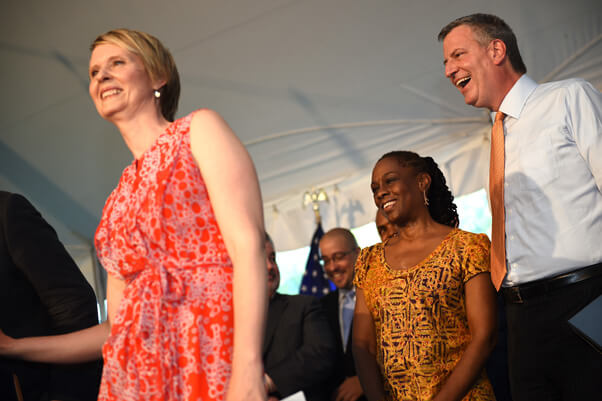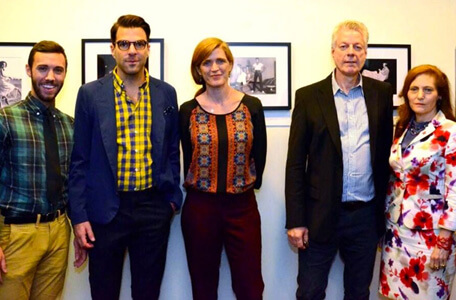David Thorstad, who co-founded or ran some early LGBTQ groups following the Stonewall riots in 1969 that are seen as marking the start of the modern LGBTQ rights movement, died on August 1 from complications during heart surgery in a North Dakota hospital.
“A giant has fallen,” wrote Steve Ault, who made significant contributions to the community organizing following the riots, in an email to Gay City News. “This is a great loss.”
Thorstad, who was 79 at his death, was the president of the Gay Activists Alliance (GAA) from July 1975 to July 1976. He was credited with stabilizing the group after it was embroiled in conflict between two earlier GAA leaders. Previously, he served as GAA’s secretary. He also organized GAA’s educational efforts titled “The Gay Liberation Forum.”
In 1977, Thorstad was among the founders of the Coalition for Lesbian and Gay Rights (CLGR), a group that eventually had over 50 member organizations that fought for the passage of legislation to add sexual orientation to New York City’s human rights law, among other issues.
The legislation was first introduced in the City Council in 1971, but had been bottled up by Thomas Cuite, the council’s Democratic majority leader who represented a Brooklyn district. Peter Vallone, a Democrat who represented a Queens district, led the majority after Cuite retired in 1985, though Vallone used the title speaker. As part of a deal to win the job, Vallone agreed to let the bill get a vote though he opposed the legislation. It passed in a 21-14 vote in 1986.
“[Thorstad] was a great strategist,” said Andy Humm who represented Dignity, the gay Roman Catholics group, in the CLGR.
Many of the activists who joined the LGBTQ rights movement following the Stonewall riots learned their organizing skills in other movements, such as the women’s movement, the anti-war movement, the civil rights movement, and other left causes. Thorstad was no exception.
Born and raised in Minnesota, Thorstad attended the University of Minnesota and graduated with a bachelor’s and a master’s in German and French. During college, he joined the Youth Socialist Alliance, a branch of the Socialist Workers Party (SWP). In 1968, he was an SWP candidate for a congressional seat representing a Minnesota district and he ran for mayor of Minneapolis in 1969 on the SWP line.
In 1967, Thorstad was “a member of the Paris Secretariat of the Bertrand Russell International War Crimes Tribunal,” which was investigating war crimes by the US in Vietnam, and an “organizer of the Twin Cities Socialist Workers Party,” according to a 1969 issue of The Militant, an SWP publication. Thorstad was also active in opposing the American war in Vietnam.
After arriving in New York City, Thorstad found himself on Sixth Avenue watching the 1970 march that first commemorated the 1969 Stonewall riots. He joined the LGBTQ movement soon after, though he continued to be involved in the SWP until he broke with that organization in 1973 over its continued intransigence on backing what Thorstad called the gay liberation movement. (Thorstad would bristle at Gay City News using LGBTQ in this article.) The SWP had lifted its ban on homosexuals in the party in 1970, but continued to debate its relationship with the gay liberation movement for three years.
“You still cling to your conception of the socialist revolution being an essentially heterosexual revolution — made of, by, and for heterosexual workers,” Thorstad wrote in a 1973 letter in which he resigned from the party. “You fear that too close an identification of the revolutionary party with gay liberation will alienate it from the (heterosexual) masses and interfere with its ability to lead the socialist revolution.”
In addition to his political work, Thorstad participated in developing LGBTQ history. He co-authored “The Early Homosexual Rights Movement (1864-1935)” with John Lauritsen and wrote “Gay Liberation and Socialism: Documents From the Discussions on Gay Liberation Inside the Socialist Workers Party (1970-1973).”
Thorstad’s fall from politics came in 1978 when he co-founded the North American Man Boy Love Association (NAMBLA) with roughly 30 other men. NAMBLA advocated for an end to age of consent laws. It argued that consent was possible in the relationships it argued for.
“We wanted to part of a broader sexual liberation movement in which our issue was part of a broader issue,” Thorstad said in a 2005 interview with Gay City News. “In hindsight, it may look unrealistic and it certainly was unrealistic.”
While Thorstad never had an interest in having sex with children — some NAMBLA members did have that interest — he saw sex between older and younger men as something that had been part of gay culture for millennia and was inherently good.
“I can say categorically that David was not a pedophile,” said Phil Willkie, the former publisher of The James White Review, a gay men’s literary quarterly, who was friends with Thorstad for 40 years. “He was a what I would call a pederast.”
NAMBLA was described by the mainstream press and law enforcement as a group of child molesters, a representation it could never change in the minds of most of the public, including many in the LGBTQ community.
NAMBLA was banned from meeting in New York City’s Lesbian, Gay, Bisexual & Transgender Community Center in 1985 and from holding a conference there, which would have featured a poetry reading by Allen Ginsberg, in 1989. NAMBLA conducted its meetings and conferences openly to the point that law enforcement agencies could easily track the group’s activities, but repeated raids by law enforcement on NAMBLA members’ homes, which rarely if ever led to criminal cases, and continued bad press ended the group. Today, it exists solely as a website.
In his email, Ault wrote that “The late Howard Wallace, a comrade of Thorstad’s in the SWP…remarked that Thorstad made a strategic error with his involvement with NAMBLA, as it deprived the gay movement of his principled and progressive leadership at a time it was sorely needed.”
Wallace was a longtime labor organizer in California who is known for, among many achievements, getting labor unions to oppose a ballot initiative in that state that would have banned gay and lesbian teachers from public schools.
Thorstad understood the implications of engagement with NAMBLA.
“When he got involved in all that NAMBLA stuff, he withdrew because he knew that wouldn’t work in coalition,” Humm said. “He understood that.”
Thorstad moved back to Minnesota in 1994 where he bought a farm in the northern part of the state. He enjoyed gardening. He continued writing and communicating with friends and colleagues. He also continued learning new languages and could speak a half dozen fluently.
“He was interested in so many things and he was well educated,” Willkie said. “He didn’t let people go. He stayed in touch with people and that was a very endearing thing about David.”
Thorstad also grew increasingly bitter about the state of the LGBTQ and left movements. He opposed the pursuit of same-sex marriage and objected to the inclusion of transgender people in the movement. But he remained true to his original principles.
“David possessed a towering intellect and was totally principled, uncompromising, charismatic and fearless,” Ault wrote. “He was also highly controversial and could be cantankerous.”

































